Ethical Dilemmas in Toyota Australia: A Management Theory Analysis
VerifiedAdded on 2020/05/11
|16
|4332
|227
Report
AI Summary
This report delves into the ethical challenges encountered by Toyota Australia, a car manufacturing company, examining them through the lens of management theory and practice. It begins by contrasting deontological and teleological ethics, highlighting how these differing viewpoints create dilemmas, particularly in areas like advertising fast cars. The report then identifies major sources of ethical dilemmas from a managerial perspective, including corruption, industrial espionage, and environmental concerns related to carbon emissions and waste disposal. The analysis explores how managers grapple with these issues, often facing conflicts between business objectives and ethical principles. The report emphasizes the need for ethical compliance and responsible business conduct in the face of these challenges, considering the impact on the company's reputation and its relationship with stakeholders.
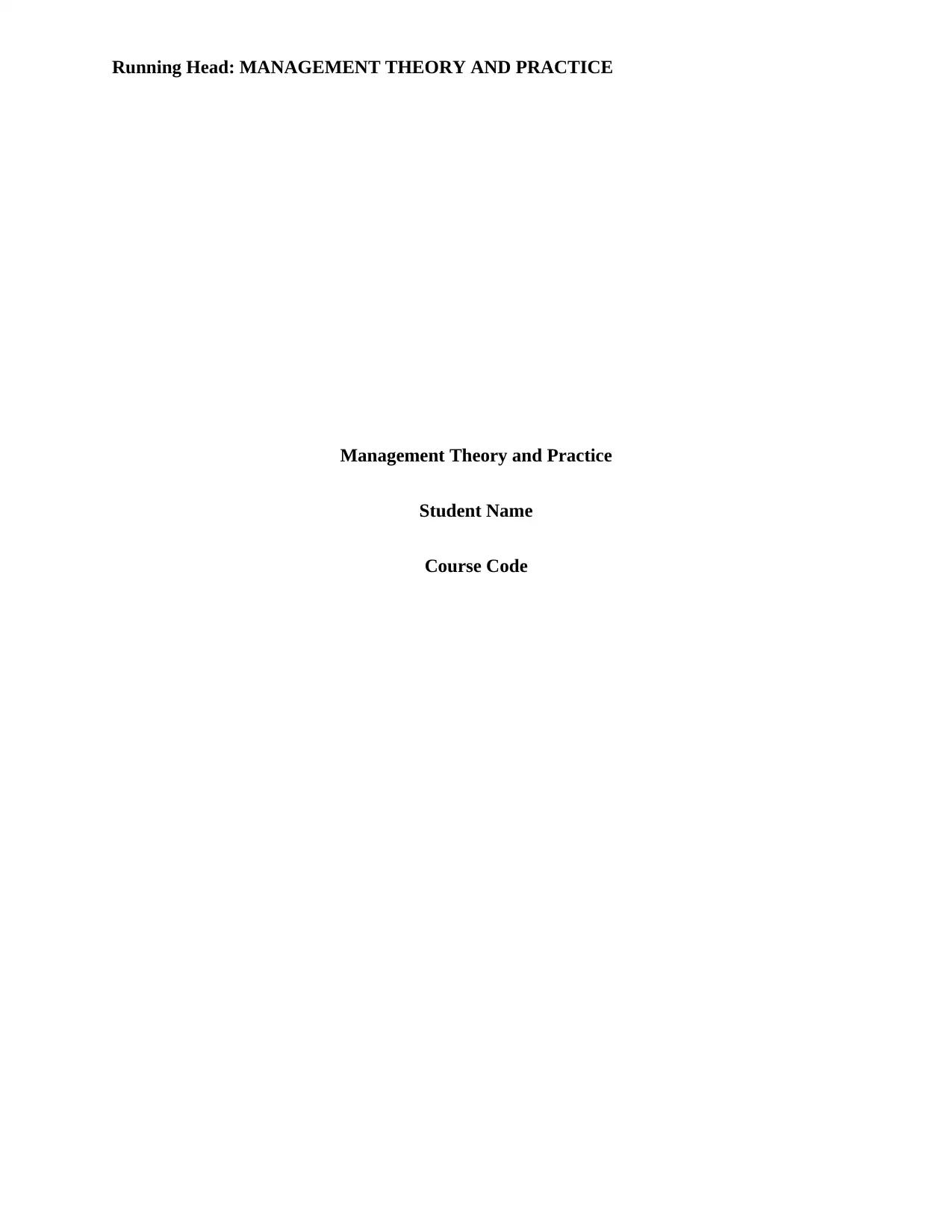
Running Head: MANAGEMENT THEORY AND PRACTICE
Management Theory and Practice
Student Name
Course Code
Management Theory and Practice
Student Name
Course Code
Paraphrase This Document
Need a fresh take? Get an instant paraphrase of this document with our AI Paraphraser
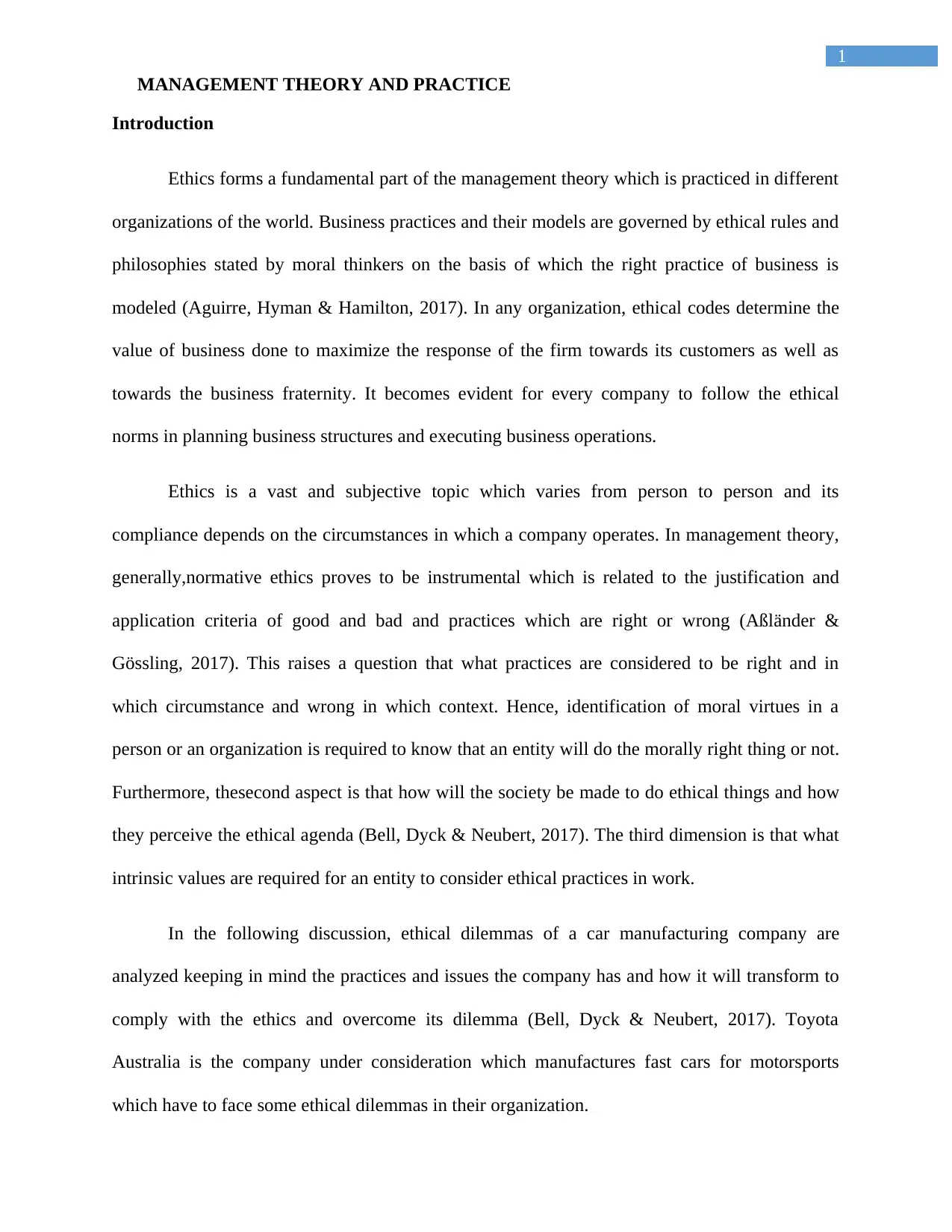
1
MANAGEMENT THEORY AND PRACTICE
Introduction
Ethics forms a fundamental part of the management theory which is practiced in different
organizations of the world. Business practices and their models are governed by ethical rules and
philosophies stated by moral thinkers on the basis of which the right practice of business is
modeled (Aguirre, Hyman & Hamilton, 2017). In any organization, ethical codes determine the
value of business done to maximize the response of the firm towards its customers as well as
towards the business fraternity. It becomes evident for every company to follow the ethical
norms in planning business structures and executing business operations.
Ethics is a vast and subjective topic which varies from person to person and its
compliance depends on the circumstances in which a company operates. In management theory,
generally,normative ethics proves to be instrumental which is related to the justification and
application criteria of good and bad and practices which are right or wrong (Aßländer &
Gössling, 2017). This raises a question that what practices are considered to be right and in
which circumstance and wrong in which context. Hence, identification of moral virtues in a
person or an organization is required to know that an entity will do the morally right thing or not.
Furthermore, thesecond aspect is that how will the society be made to do ethical things and how
they perceive the ethical agenda (Bell, Dyck & Neubert, 2017). The third dimension is that what
intrinsic values are required for an entity to consider ethical practices in work.
In the following discussion, ethical dilemmas of a car manufacturing company are
analyzed keeping in mind the practices and issues the company has and how it will transform to
comply with the ethics and overcome its dilemma (Bell, Dyck & Neubert, 2017). Toyota
Australia is the company under consideration which manufactures fast cars for motorsports
which have to face some ethical dilemmas in their organization.
MANAGEMENT THEORY AND PRACTICE
Introduction
Ethics forms a fundamental part of the management theory which is practiced in different
organizations of the world. Business practices and their models are governed by ethical rules and
philosophies stated by moral thinkers on the basis of which the right practice of business is
modeled (Aguirre, Hyman & Hamilton, 2017). In any organization, ethical codes determine the
value of business done to maximize the response of the firm towards its customers as well as
towards the business fraternity. It becomes evident for every company to follow the ethical
norms in planning business structures and executing business operations.
Ethics is a vast and subjective topic which varies from person to person and its
compliance depends on the circumstances in which a company operates. In management theory,
generally,normative ethics proves to be instrumental which is related to the justification and
application criteria of good and bad and practices which are right or wrong (Aßländer &
Gössling, 2017). This raises a question that what practices are considered to be right and in
which circumstance and wrong in which context. Hence, identification of moral virtues in a
person or an organization is required to know that an entity will do the morally right thing or not.
Furthermore, thesecond aspect is that how will the society be made to do ethical things and how
they perceive the ethical agenda (Bell, Dyck & Neubert, 2017). The third dimension is that what
intrinsic values are required for an entity to consider ethical practices in work.
In the following discussion, ethical dilemmas of a car manufacturing company are
analyzed keeping in mind the practices and issues the company has and how it will transform to
comply with the ethics and overcome its dilemma (Bell, Dyck & Neubert, 2017). Toyota
Australia is the company under consideration which manufactures fast cars for motorsports
which have to face some ethical dilemmas in their organization.
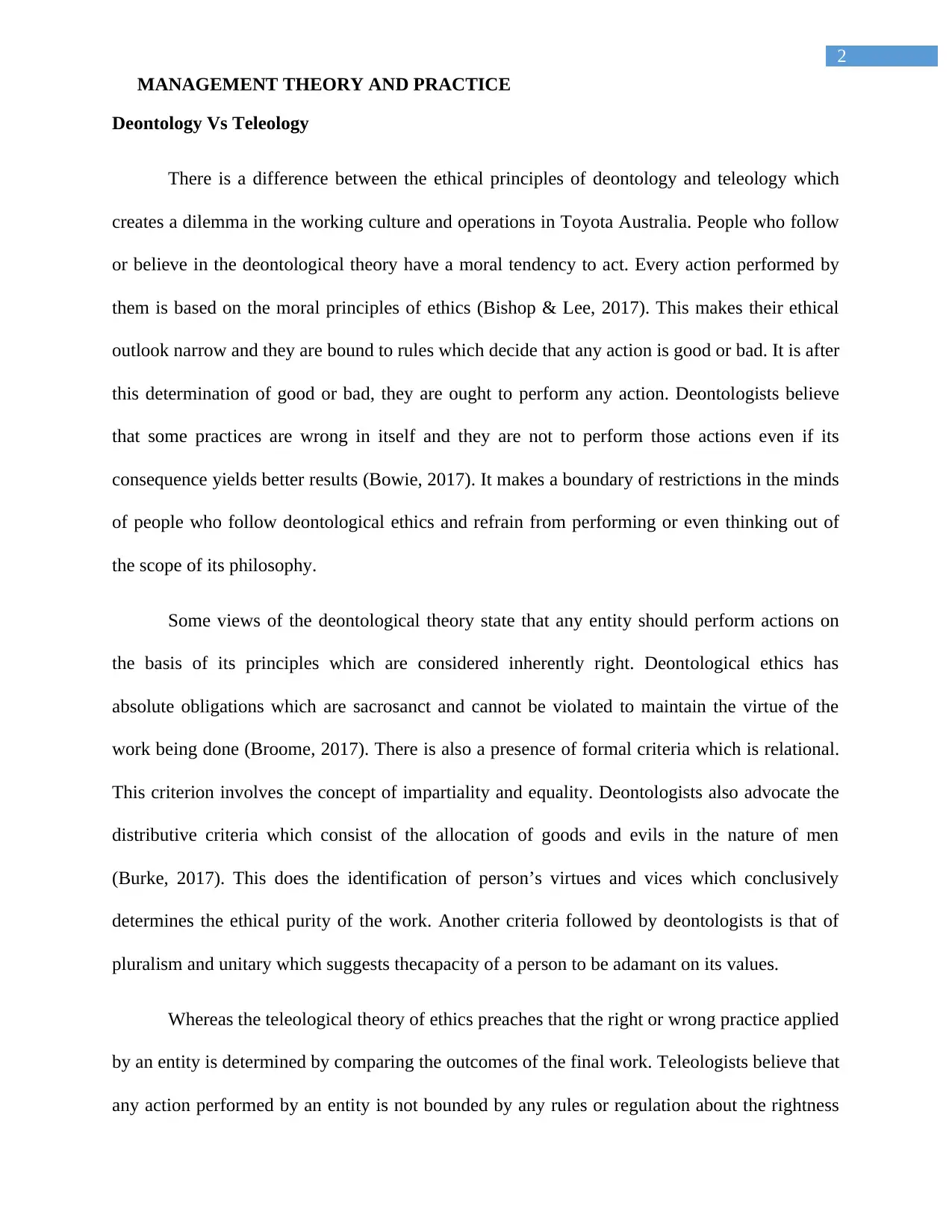
2
MANAGEMENT THEORY AND PRACTICE
Deontology Vs Teleology
There is a difference between the ethical principles of deontology and teleology which
creates a dilemma in the working culture and operations in Toyota Australia. People who follow
or believe in the deontological theory have a moral tendency to act. Every action performed by
them is based on the moral principles of ethics (Bishop & Lee, 2017). This makes their ethical
outlook narrow and they are bound to rules which decide that any action is good or bad. It is after
this determination of good or bad, they are ought to perform any action. Deontologists believe
that some practices are wrong in itself and they are not to perform those actions even if its
consequence yields better results (Bowie, 2017). It makes a boundary of restrictions in the minds
of people who follow deontological ethics and refrain from performing or even thinking out of
the scope of its philosophy.
Some views of the deontological theory state that any entity should perform actions on
the basis of its principles which are considered inherently right. Deontological ethics has
absolute obligations which are sacrosanct and cannot be violated to maintain the virtue of the
work being done (Broome, 2017). There is also a presence of formal criteria which is relational.
This criterion involves the concept of impartiality and equality. Deontologists also advocate the
distributive criteria which consist of the allocation of goods and evils in the nature of men
(Burke, 2017). This does the identification of person’s virtues and vices which conclusively
determines the ethical purity of the work. Another criteria followed by deontologists is that of
pluralism and unitary which suggests thecapacity of a person to be adamant on its values.
Whereas the teleological theory of ethics preaches that the right or wrong practice applied
by an entity is determined by comparing the outcomes of the final work. Teleologists believe that
any action performed by an entity is not bounded by any rules or regulation about the rightness
MANAGEMENT THEORY AND PRACTICE
Deontology Vs Teleology
There is a difference between the ethical principles of deontology and teleology which
creates a dilemma in the working culture and operations in Toyota Australia. People who follow
or believe in the deontological theory have a moral tendency to act. Every action performed by
them is based on the moral principles of ethics (Bishop & Lee, 2017). This makes their ethical
outlook narrow and they are bound to rules which decide that any action is good or bad. It is after
this determination of good or bad, they are ought to perform any action. Deontologists believe
that some practices are wrong in itself and they are not to perform those actions even if its
consequence yields better results (Bowie, 2017). It makes a boundary of restrictions in the minds
of people who follow deontological ethics and refrain from performing or even thinking out of
the scope of its philosophy.
Some views of the deontological theory state that any entity should perform actions on
the basis of its principles which are considered inherently right. Deontological ethics has
absolute obligations which are sacrosanct and cannot be violated to maintain the virtue of the
work being done (Broome, 2017). There is also a presence of formal criteria which is relational.
This criterion involves the concept of impartiality and equality. Deontologists also advocate the
distributive criteria which consist of the allocation of goods and evils in the nature of men
(Burke, 2017). This does the identification of person’s virtues and vices which conclusively
determines the ethical purity of the work. Another criteria followed by deontologists is that of
pluralism and unitary which suggests thecapacity of a person to be adamant on its values.
Whereas the teleological theory of ethics preaches that the right or wrong practice applied
by an entity is determined by comparing the outcomes of the final work. Teleologists believe that
any action performed by an entity is not bounded by any rules or regulation about the rightness
⊘ This is a preview!⊘
Do you want full access?
Subscribe today to unlock all pages.

Trusted by 1+ million students worldwide
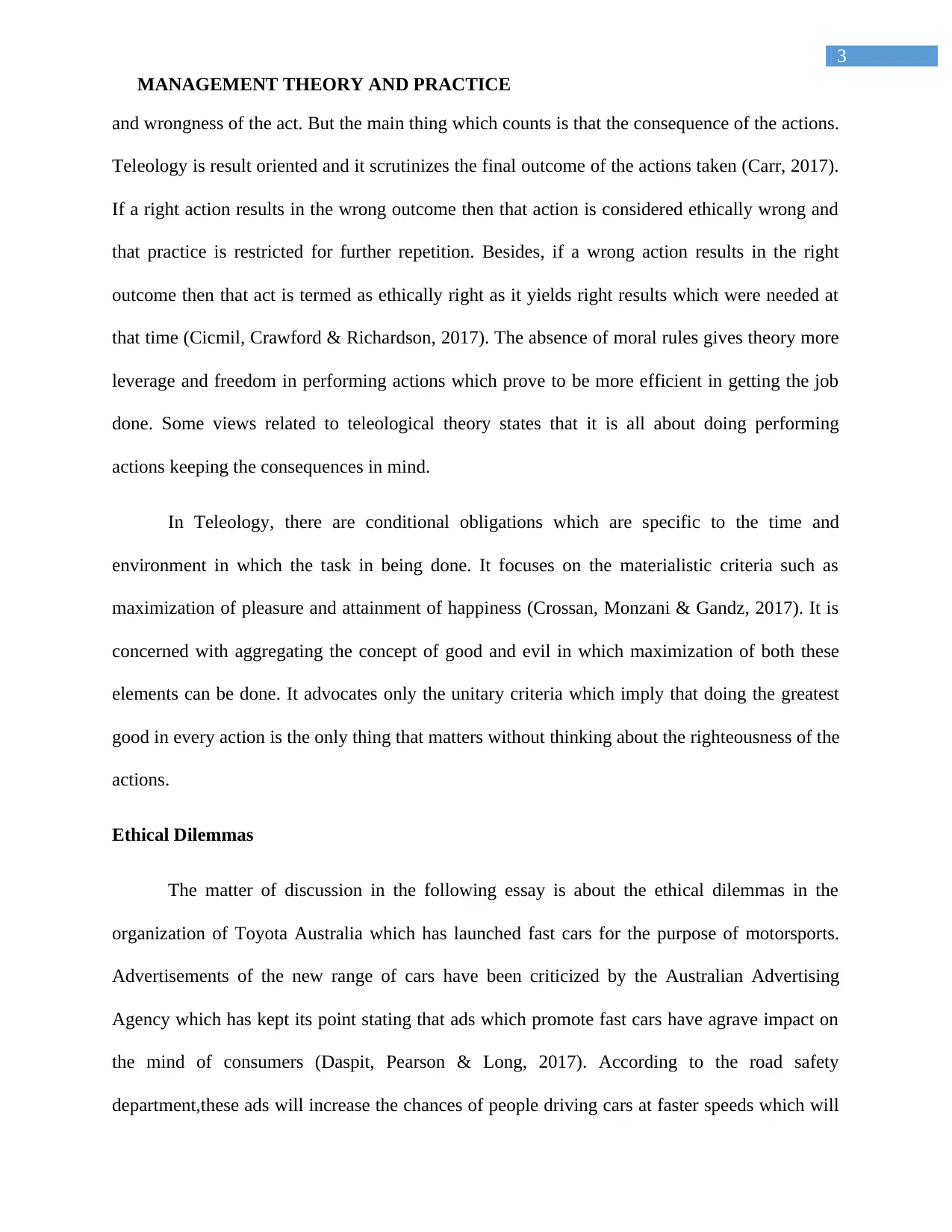
3
MANAGEMENT THEORY AND PRACTICE
and wrongness of the act. But the main thing which counts is that the consequence of the actions.
Teleology is result oriented and it scrutinizes the final outcome of the actions taken (Carr, 2017).
If a right action results in the wrong outcome then that action is considered ethically wrong and
that practice is restricted for further repetition. Besides, if a wrong action results in the right
outcome then that act is termed as ethically right as it yields right results which were needed at
that time (Cicmil, Crawford & Richardson, 2017). The absence of moral rules gives theory more
leverage and freedom in performing actions which prove to be more efficient in getting the job
done. Some views related to teleological theory states that it is all about doing performing
actions keeping the consequences in mind.
In Teleology, there are conditional obligations which are specific to the time and
environment in which the task in being done. It focuses on the materialistic criteria such as
maximization of pleasure and attainment of happiness (Crossan, Monzani & Gandz, 2017). It is
concerned with aggregating the concept of good and evil in which maximization of both these
elements can be done. It advocates only the unitary criteria which imply that doing the greatest
good in every action is the only thing that matters without thinking about the righteousness of the
actions.
Ethical Dilemmas
The matter of discussion in the following essay is about the ethical dilemmas in the
organization of Toyota Australia which has launched fast cars for the purpose of motorsports.
Advertisements of the new range of cars have been criticized by the Australian Advertising
Agency which has kept its point stating that ads which promote fast cars have agrave impact on
the mind of consumers (Daspit, Pearson & Long, 2017). According to the road safety
department,these ads will increase the chances of people driving cars at faster speeds which will
MANAGEMENT THEORY AND PRACTICE
and wrongness of the act. But the main thing which counts is that the consequence of the actions.
Teleology is result oriented and it scrutinizes the final outcome of the actions taken (Carr, 2017).
If a right action results in the wrong outcome then that action is considered ethically wrong and
that practice is restricted for further repetition. Besides, if a wrong action results in the right
outcome then that act is termed as ethically right as it yields right results which were needed at
that time (Cicmil, Crawford & Richardson, 2017). The absence of moral rules gives theory more
leverage and freedom in performing actions which prove to be more efficient in getting the job
done. Some views related to teleological theory states that it is all about doing performing
actions keeping the consequences in mind.
In Teleology, there are conditional obligations which are specific to the time and
environment in which the task in being done. It focuses on the materialistic criteria such as
maximization of pleasure and attainment of happiness (Crossan, Monzani & Gandz, 2017). It is
concerned with aggregating the concept of good and evil in which maximization of both these
elements can be done. It advocates only the unitary criteria which imply that doing the greatest
good in every action is the only thing that matters without thinking about the righteousness of the
actions.
Ethical Dilemmas
The matter of discussion in the following essay is about the ethical dilemmas in the
organization of Toyota Australia which has launched fast cars for the purpose of motorsports.
Advertisements of the new range of cars have been criticized by the Australian Advertising
Agency which has kept its point stating that ads which promote fast cars have agrave impact on
the mind of consumers (Daspit, Pearson & Long, 2017). According to the road safety
department,these ads will increase the chances of people driving cars at faster speeds which will
Paraphrase This Document
Need a fresh take? Get an instant paraphrase of this document with our AI Paraphraser
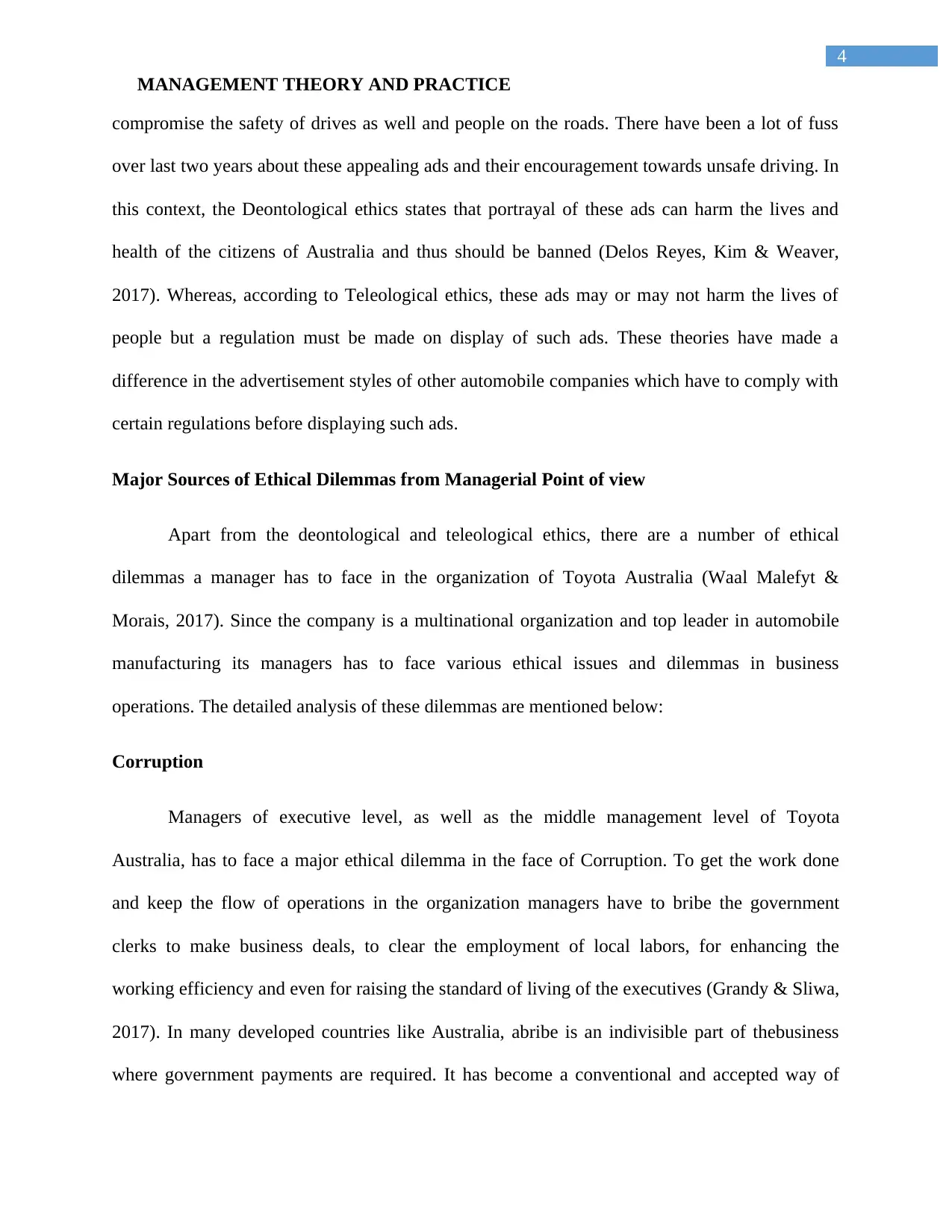
4
MANAGEMENT THEORY AND PRACTICE
compromise the safety of drives as well and people on the roads. There have been a lot of fuss
over last two years about these appealing ads and their encouragement towards unsafe driving. In
this context, the Deontological ethics states that portrayal of these ads can harm the lives and
health of the citizens of Australia and thus should be banned (Delos Reyes, Kim & Weaver,
2017). Whereas, according to Teleological ethics, these ads may or may not harm the lives of
people but a regulation must be made on display of such ads. These theories have made a
difference in the advertisement styles of other automobile companies which have to comply with
certain regulations before displaying such ads.
Major Sources of Ethical Dilemmas from Managerial Point of view
Apart from the deontological and teleological ethics, there are a number of ethical
dilemmas a manager has to face in the organization of Toyota Australia (Waal Malefyt &
Morais, 2017). Since the company is a multinational organization and top leader in automobile
manufacturing its managers has to face various ethical issues and dilemmas in business
operations. The detailed analysis of these dilemmas are mentioned below:
Corruption
Managers of executive level, as well as the middle management level of Toyota
Australia, has to face a major ethical dilemma in the face of Corruption. To get the work done
and keep the flow of operations in the organization managers have to bribe the government
clerks to make business deals, to clear the employment of local labors, for enhancing the
working efficiency and even for raising the standard of living of the executives (Grandy & Sliwa,
2017). In many developed countries like Australia, abribe is an indivisible part of thebusiness
where government payments are required. It has become a conventional and accepted way of
MANAGEMENT THEORY AND PRACTICE
compromise the safety of drives as well and people on the roads. There have been a lot of fuss
over last two years about these appealing ads and their encouragement towards unsafe driving. In
this context, the Deontological ethics states that portrayal of these ads can harm the lives and
health of the citizens of Australia and thus should be banned (Delos Reyes, Kim & Weaver,
2017). Whereas, according to Teleological ethics, these ads may or may not harm the lives of
people but a regulation must be made on display of such ads. These theories have made a
difference in the advertisement styles of other automobile companies which have to comply with
certain regulations before displaying such ads.
Major Sources of Ethical Dilemmas from Managerial Point of view
Apart from the deontological and teleological ethics, there are a number of ethical
dilemmas a manager has to face in the organization of Toyota Australia (Waal Malefyt &
Morais, 2017). Since the company is a multinational organization and top leader in automobile
manufacturing its managers has to face various ethical issues and dilemmas in business
operations. The detailed analysis of these dilemmas are mentioned below:
Corruption
Managers of executive level, as well as the middle management level of Toyota
Australia, has to face a major ethical dilemma in the face of Corruption. To get the work done
and keep the flow of operations in the organization managers have to bribe the government
clerks to make business deals, to clear the employment of local labors, for enhancing the
working efficiency and even for raising the standard of living of the executives (Grandy & Sliwa,
2017). In many developed countries like Australia, abribe is an indivisible part of thebusiness
where government payments are required. It has become a conventional and accepted way of
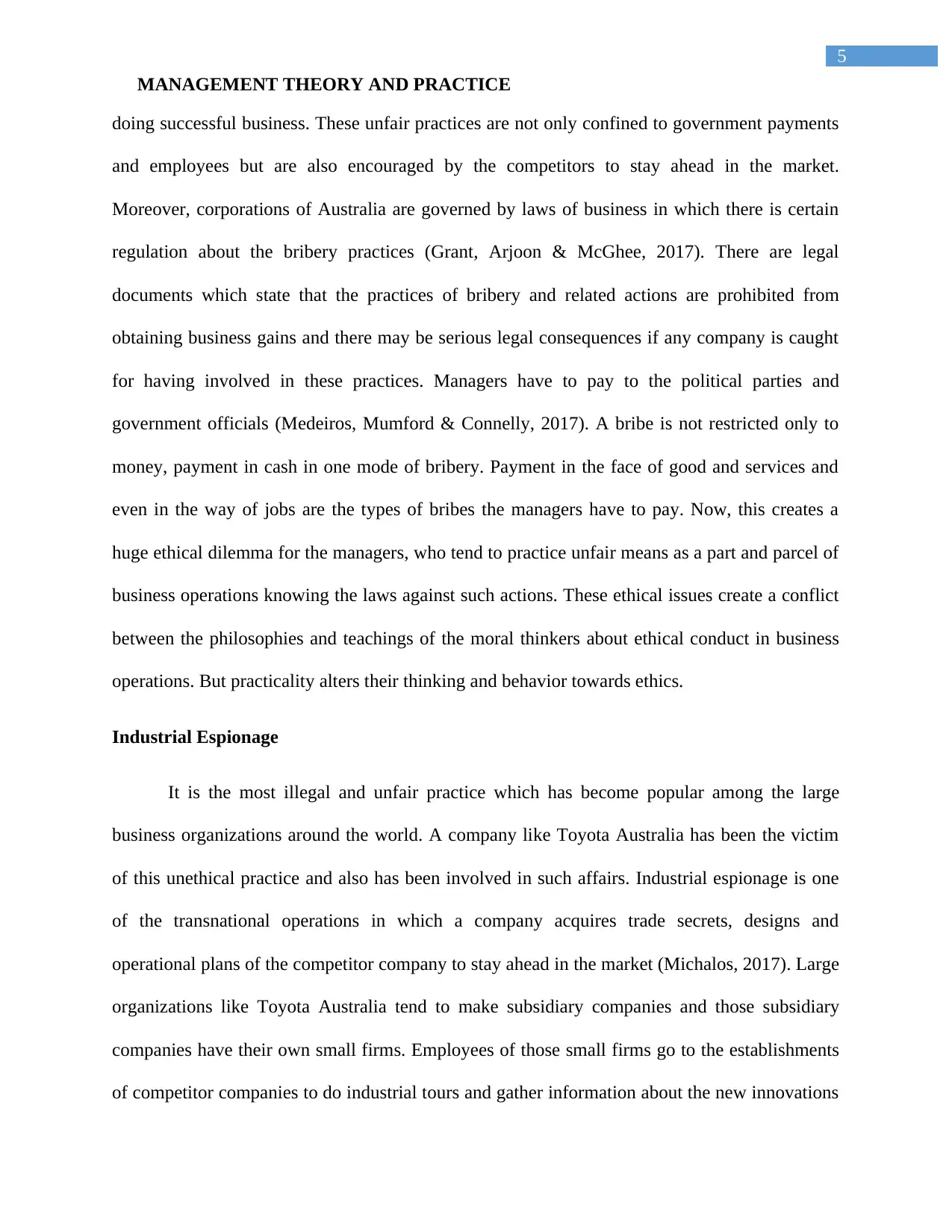
5
MANAGEMENT THEORY AND PRACTICE
doing successful business. These unfair practices are not only confined to government payments
and employees but are also encouraged by the competitors to stay ahead in the market.
Moreover, corporations of Australia are governed by laws of business in which there is certain
regulation about the bribery practices (Grant, Arjoon & McGhee, 2017). There are legal
documents which state that the practices of bribery and related actions are prohibited from
obtaining business gains and there may be serious legal consequences if any company is caught
for having involved in these practices. Managers have to pay to the political parties and
government officials (Medeiros, Mumford & Connelly, 2017). A bribe is not restricted only to
money, payment in cash in one mode of bribery. Payment in the face of good and services and
even in the way of jobs are the types of bribes the managers have to pay. Now, this creates a
huge ethical dilemma for the managers, who tend to practice unfair means as a part and parcel of
business operations knowing the laws against such actions. These ethical issues create a conflict
between the philosophies and teachings of the moral thinkers about ethical conduct in business
operations. But practicality alters their thinking and behavior towards ethics.
Industrial Espionage
It is the most illegal and unfair practice which has become popular among the large
business organizations around the world. A company like Toyota Australia has been the victim
of this unethical practice and also has been involved in such affairs. Industrial espionage is one
of the transnational operations in which a company acquires trade secrets, designs and
operational plans of the competitor company to stay ahead in the market (Michalos, 2017). Large
organizations like Toyota Australia tend to make subsidiary companies and those subsidiary
companies have their own small firms. Employees of those small firms go to the establishments
of competitor companies to do industrial tours and gather information about the new innovations
MANAGEMENT THEORY AND PRACTICE
doing successful business. These unfair practices are not only confined to government payments
and employees but are also encouraged by the competitors to stay ahead in the market.
Moreover, corporations of Australia are governed by laws of business in which there is certain
regulation about the bribery practices (Grant, Arjoon & McGhee, 2017). There are legal
documents which state that the practices of bribery and related actions are prohibited from
obtaining business gains and there may be serious legal consequences if any company is caught
for having involved in these practices. Managers have to pay to the political parties and
government officials (Medeiros, Mumford & Connelly, 2017). A bribe is not restricted only to
money, payment in cash in one mode of bribery. Payment in the face of good and services and
even in the way of jobs are the types of bribes the managers have to pay. Now, this creates a
huge ethical dilemma for the managers, who tend to practice unfair means as a part and parcel of
business operations knowing the laws against such actions. These ethical issues create a conflict
between the philosophies and teachings of the moral thinkers about ethical conduct in business
operations. But practicality alters their thinking and behavior towards ethics.
Industrial Espionage
It is the most illegal and unfair practice which has become popular among the large
business organizations around the world. A company like Toyota Australia has been the victim
of this unethical practice and also has been involved in such affairs. Industrial espionage is one
of the transnational operations in which a company acquires trade secrets, designs and
operational plans of the competitor company to stay ahead in the market (Michalos, 2017). Large
organizations like Toyota Australia tend to make subsidiary companies and those subsidiary
companies have their own small firms. Employees of those small firms go to the establishments
of competitor companies to do industrial tours and gather information about the new innovations
⊘ This is a preview!⊘
Do you want full access?
Subscribe today to unlock all pages.

Trusted by 1+ million students worldwide
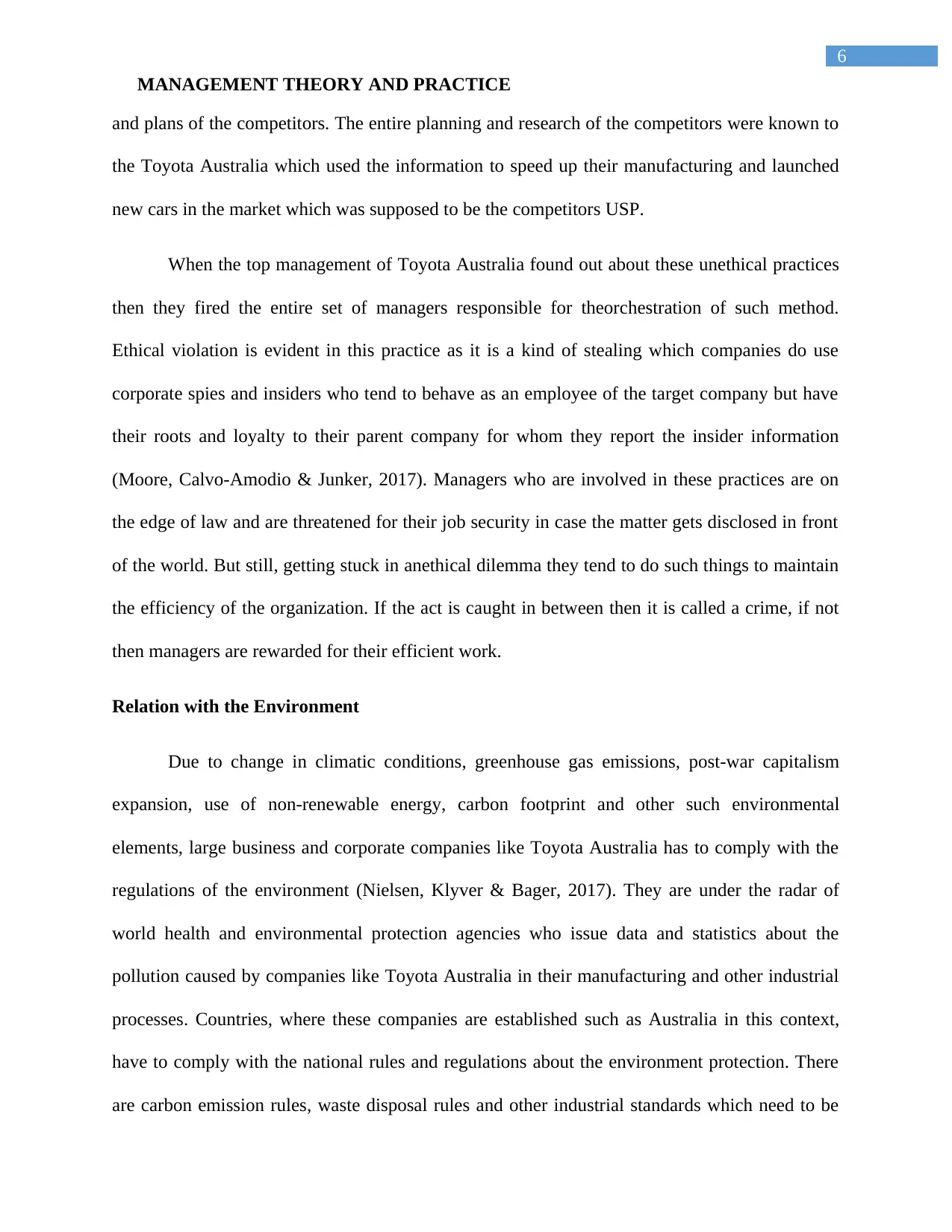
6
MANAGEMENT THEORY AND PRACTICE
and plans of the competitors. The entire planning and research of the competitors were known to
the Toyota Australia which used the information to speed up their manufacturing and launched
new cars in the market which was supposed to be the competitors USP.
When the top management of Toyota Australia found out about these unethical practices
then they fired the entire set of managers responsible for theorchestration of such method.
Ethical violation is evident in this practice as it is a kind of stealing which companies do use
corporate spies and insiders who tend to behave as an employee of the target company but have
their roots and loyalty to their parent company for whom they report the insider information
(Moore, Calvo-Amodio & Junker, 2017). Managers who are involved in these practices are on
the edge of law and are threatened for their job security in case the matter gets disclosed in front
of the world. But still, getting stuck in anethical dilemma they tend to do such things to maintain
the efficiency of the organization. If the act is caught in between then it is called a crime, if not
then managers are rewarded for their efficient work.
Relation with the Environment
Due to change in climatic conditions, greenhouse gas emissions, post-war capitalism
expansion, use of non-renewable energy, carbon footprint and other such environmental
elements, large business and corporate companies like Toyota Australia has to comply with the
regulations of the environment (Nielsen, Klyver & Bager, 2017). They are under the radar of
world health and environmental protection agencies who issue data and statistics about the
pollution caused by companies like Toyota Australia in their manufacturing and other industrial
processes. Countries, where these companies are established such as Australia in this context,
have to comply with the national rules and regulations about the environment protection. There
are carbon emission rules, waste disposal rules and other industrial standards which need to be
MANAGEMENT THEORY AND PRACTICE
and plans of the competitors. The entire planning and research of the competitors were known to
the Toyota Australia which used the information to speed up their manufacturing and launched
new cars in the market which was supposed to be the competitors USP.
When the top management of Toyota Australia found out about these unethical practices
then they fired the entire set of managers responsible for theorchestration of such method.
Ethical violation is evident in this practice as it is a kind of stealing which companies do use
corporate spies and insiders who tend to behave as an employee of the target company but have
their roots and loyalty to their parent company for whom they report the insider information
(Moore, Calvo-Amodio & Junker, 2017). Managers who are involved in these practices are on
the edge of law and are threatened for their job security in case the matter gets disclosed in front
of the world. But still, getting stuck in anethical dilemma they tend to do such things to maintain
the efficiency of the organization. If the act is caught in between then it is called a crime, if not
then managers are rewarded for their efficient work.
Relation with the Environment
Due to change in climatic conditions, greenhouse gas emissions, post-war capitalism
expansion, use of non-renewable energy, carbon footprint and other such environmental
elements, large business and corporate companies like Toyota Australia has to comply with the
regulations of the environment (Nielsen, Klyver & Bager, 2017). They are under the radar of
world health and environmental protection agencies who issue data and statistics about the
pollution caused by companies like Toyota Australia in their manufacturing and other industrial
processes. Countries, where these companies are established such as Australia in this context,
have to comply with the national rules and regulations about the environment protection. There
are carbon emission rules, waste disposal rules and other industrial standards which need to be
Paraphrase This Document
Need a fresh take? Get an instant paraphrase of this document with our AI Paraphraser
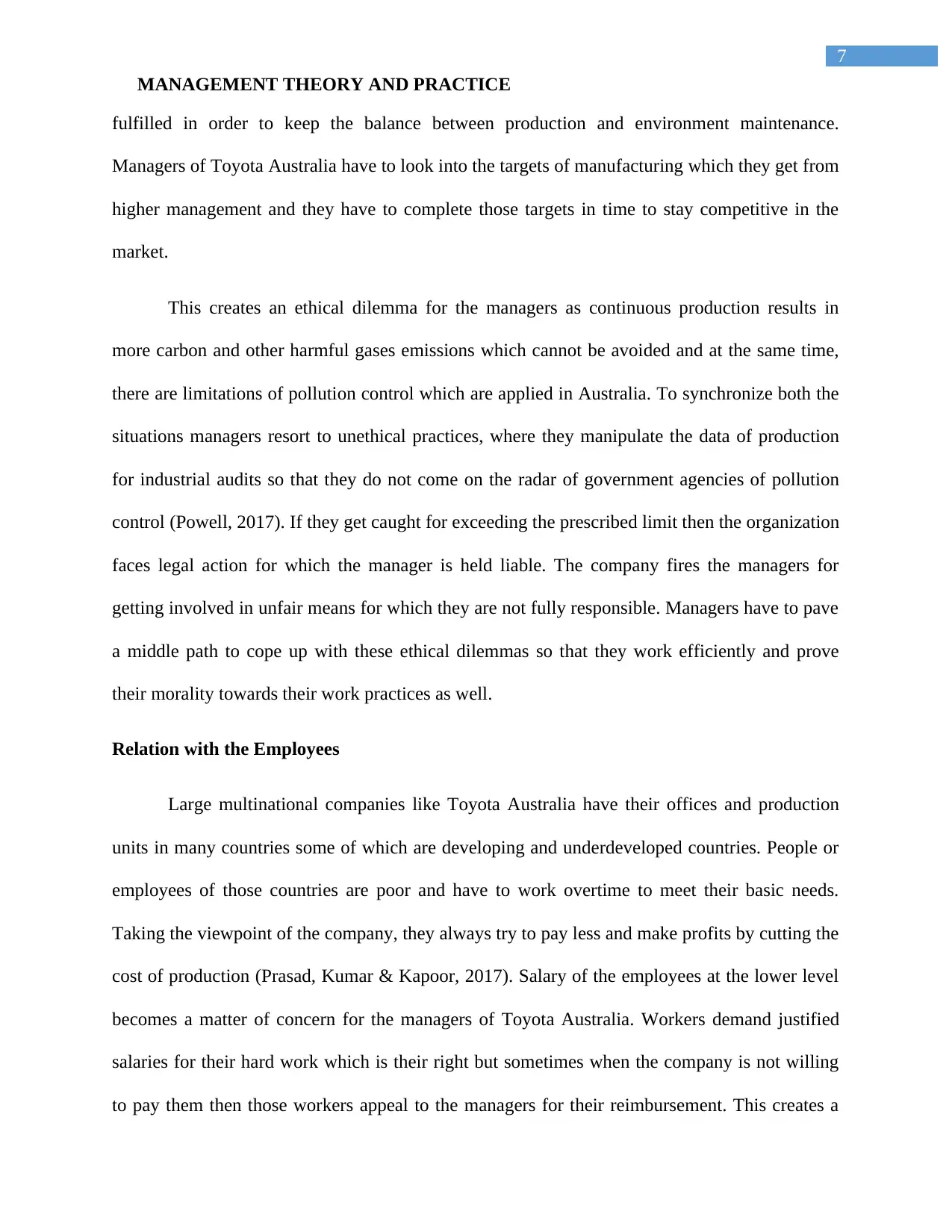
7
MANAGEMENT THEORY AND PRACTICE
fulfilled in order to keep the balance between production and environment maintenance.
Managers of Toyota Australia have to look into the targets of manufacturing which they get from
higher management and they have to complete those targets in time to stay competitive in the
market.
This creates an ethical dilemma for the managers as continuous production results in
more carbon and other harmful gases emissions which cannot be avoided and at the same time,
there are limitations of pollution control which are applied in Australia. To synchronize both the
situations managers resort to unethical practices, where they manipulate the data of production
for industrial audits so that they do not come on the radar of government agencies of pollution
control (Powell, 2017). If they get caught for exceeding the prescribed limit then the organization
faces legal action for which the manager is held liable. The company fires the managers for
getting involved in unfair means for which they are not fully responsible. Managers have to pave
a middle path to cope up with these ethical dilemmas so that they work efficiently and prove
their morality towards their work practices as well.
Relation with the Employees
Large multinational companies like Toyota Australia have their offices and production
units in many countries some of which are developing and underdeveloped countries. People or
employees of those countries are poor and have to work overtime to meet their basic needs.
Taking the viewpoint of the company, they always try to pay less and make profits by cutting the
cost of production (Prasad, Kumar & Kapoor, 2017). Salary of the employees at the lower level
becomes a matter of concern for the managers of Toyota Australia. Workers demand justified
salaries for their hard work which is their right but sometimes when the company is not willing
to pay them then those workers appeal to the managers for their reimbursement. This creates a
MANAGEMENT THEORY AND PRACTICE
fulfilled in order to keep the balance between production and environment maintenance.
Managers of Toyota Australia have to look into the targets of manufacturing which they get from
higher management and they have to complete those targets in time to stay competitive in the
market.
This creates an ethical dilemma for the managers as continuous production results in
more carbon and other harmful gases emissions which cannot be avoided and at the same time,
there are limitations of pollution control which are applied in Australia. To synchronize both the
situations managers resort to unethical practices, where they manipulate the data of production
for industrial audits so that they do not come on the radar of government agencies of pollution
control (Powell, 2017). If they get caught for exceeding the prescribed limit then the organization
faces legal action for which the manager is held liable. The company fires the managers for
getting involved in unfair means for which they are not fully responsible. Managers have to pave
a middle path to cope up with these ethical dilemmas so that they work efficiently and prove
their morality towards their work practices as well.
Relation with the Employees
Large multinational companies like Toyota Australia have their offices and production
units in many countries some of which are developing and underdeveloped countries. People or
employees of those countries are poor and have to work overtime to meet their basic needs.
Taking the viewpoint of the company, they always try to pay less and make profits by cutting the
cost of production (Prasad, Kumar & Kapoor, 2017). Salary of the employees at the lower level
becomes a matter of concern for the managers of Toyota Australia. Workers demand justified
salaries for their hard work which is their right but sometimes when the company is not willing
to pay them then those workers appeal to the managers for their reimbursement. This creates a
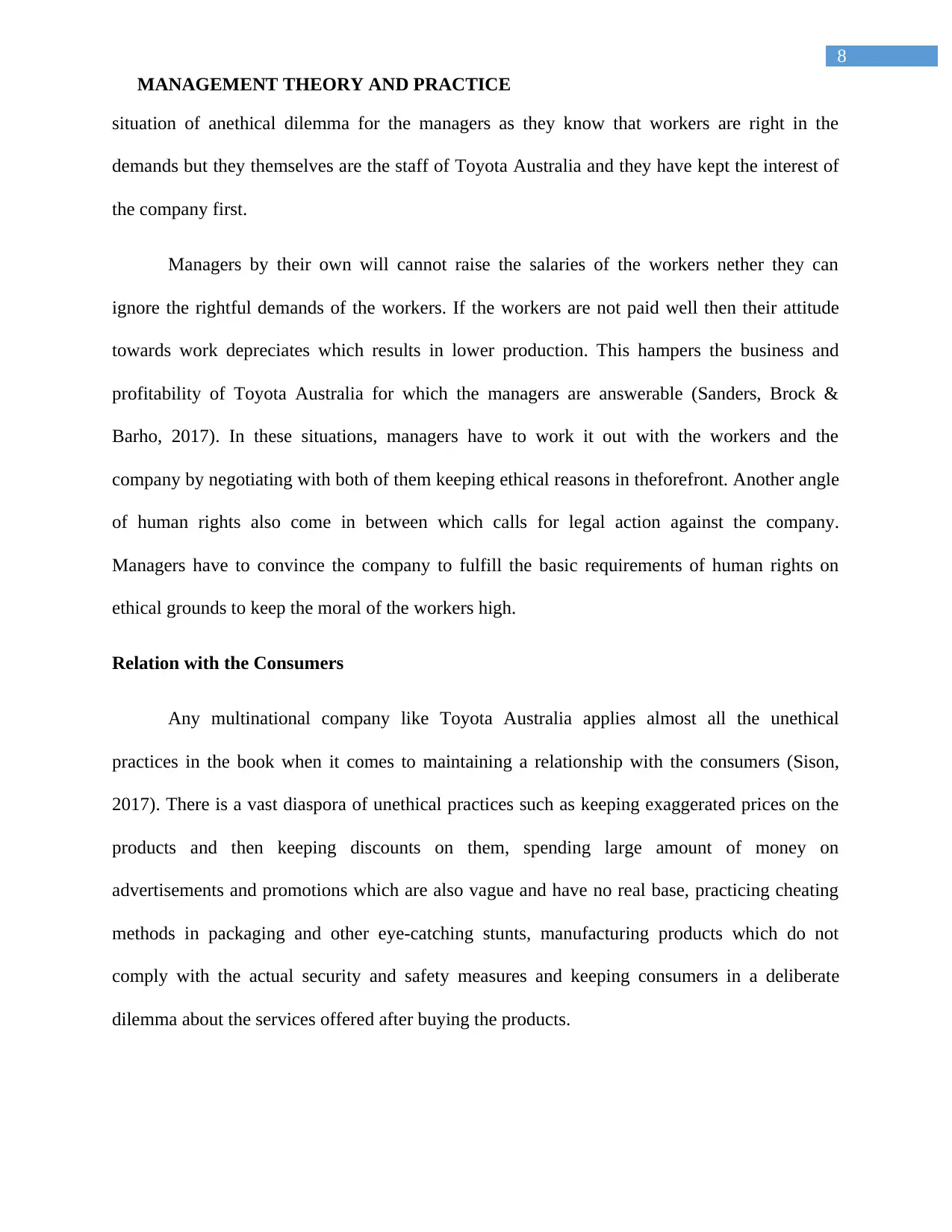
8
MANAGEMENT THEORY AND PRACTICE
situation of anethical dilemma for the managers as they know that workers are right in the
demands but they themselves are the staff of Toyota Australia and they have kept the interest of
the company first.
Managers by their own will cannot raise the salaries of the workers nether they can
ignore the rightful demands of the workers. If the workers are not paid well then their attitude
towards work depreciates which results in lower production. This hampers the business and
profitability of Toyota Australia for which the managers are answerable (Sanders, Brock &
Barho, 2017). In these situations, managers have to work it out with the workers and the
company by negotiating with both of them keeping ethical reasons in theforefront. Another angle
of human rights also come in between which calls for legal action against the company.
Managers have to convince the company to fulfill the basic requirements of human rights on
ethical grounds to keep the moral of the workers high.
Relation with the Consumers
Any multinational company like Toyota Australia applies almost all the unethical
practices in the book when it comes to maintaining a relationship with the consumers (Sison,
2017). There is a vast diaspora of unethical practices such as keeping exaggerated prices on the
products and then keeping discounts on them, spending large amount of money on
advertisements and promotions which are also vague and have no real base, practicing cheating
methods in packaging and other eye-catching stunts, manufacturing products which do not
comply with the actual security and safety measures and keeping consumers in a deliberate
dilemma about the services offered after buying the products.
MANAGEMENT THEORY AND PRACTICE
situation of anethical dilemma for the managers as they know that workers are right in the
demands but they themselves are the staff of Toyota Australia and they have kept the interest of
the company first.
Managers by their own will cannot raise the salaries of the workers nether they can
ignore the rightful demands of the workers. If the workers are not paid well then their attitude
towards work depreciates which results in lower production. This hampers the business and
profitability of Toyota Australia for which the managers are answerable (Sanders, Brock &
Barho, 2017). In these situations, managers have to work it out with the workers and the
company by negotiating with both of them keeping ethical reasons in theforefront. Another angle
of human rights also come in between which calls for legal action against the company.
Managers have to convince the company to fulfill the basic requirements of human rights on
ethical grounds to keep the moral of the workers high.
Relation with the Consumers
Any multinational company like Toyota Australia applies almost all the unethical
practices in the book when it comes to maintaining a relationship with the consumers (Sison,
2017). There is a vast diaspora of unethical practices such as keeping exaggerated prices on the
products and then keeping discounts on them, spending large amount of money on
advertisements and promotions which are also vague and have no real base, practicing cheating
methods in packaging and other eye-catching stunts, manufacturing products which do not
comply with the actual security and safety measures and keeping consumers in a deliberate
dilemma about the services offered after buying the products.
⊘ This is a preview!⊘
Do you want full access?
Subscribe today to unlock all pages.

Trusted by 1+ million students worldwide
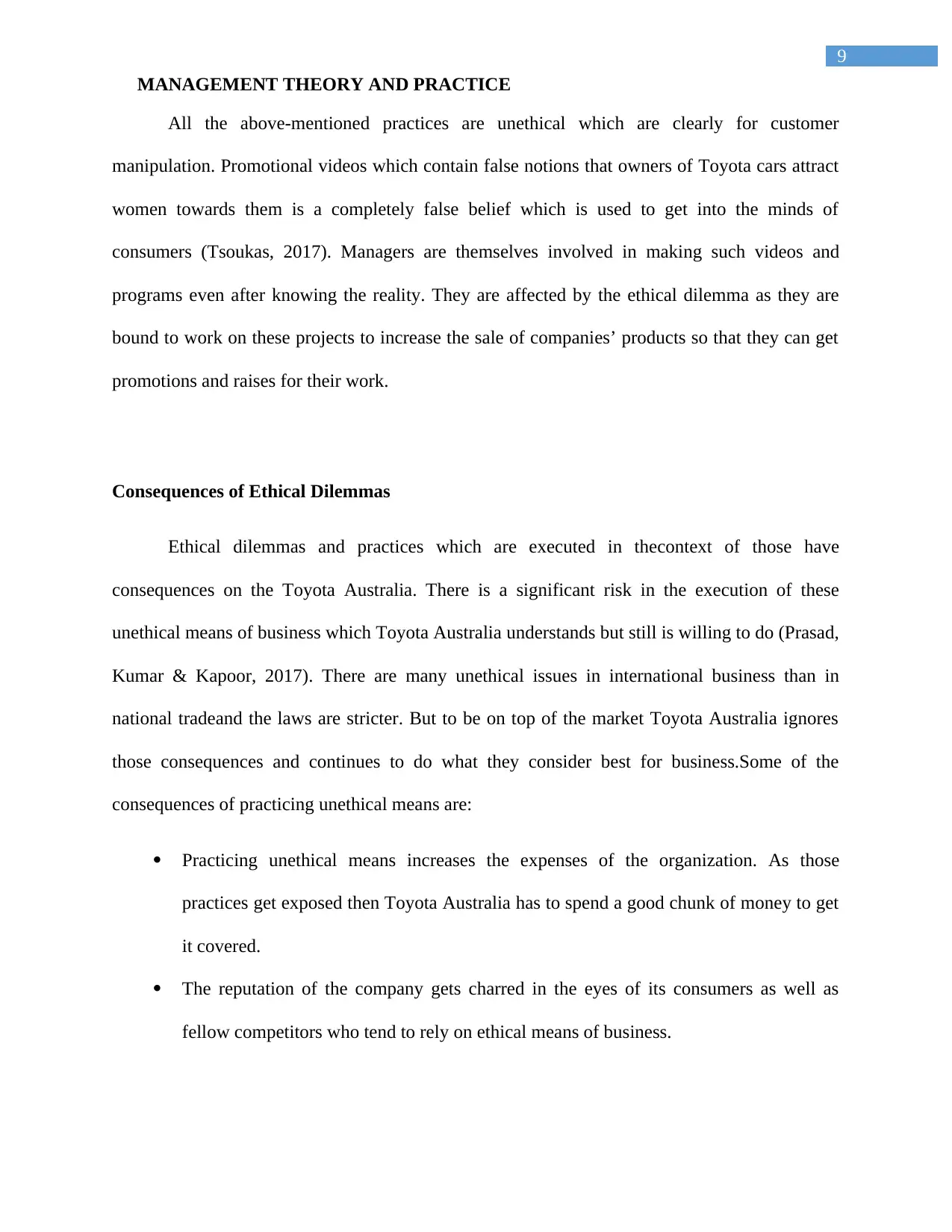
9
MANAGEMENT THEORY AND PRACTICE
All the above-mentioned practices are unethical which are clearly for customer
manipulation. Promotional videos which contain false notions that owners of Toyota cars attract
women towards them is a completely false belief which is used to get into the minds of
consumers (Tsoukas, 2017). Managers are themselves involved in making such videos and
programs even after knowing the reality. They are affected by the ethical dilemma as they are
bound to work on these projects to increase the sale of companies’ products so that they can get
promotions and raises for their work.
Consequences of Ethical Dilemmas
Ethical dilemmas and practices which are executed in thecontext of those have
consequences on the Toyota Australia. There is a significant risk in the execution of these
unethical means of business which Toyota Australia understands but still is willing to do (Prasad,
Kumar & Kapoor, 2017). There are many unethical issues in international business than in
national tradeand the laws are stricter. But to be on top of the market Toyota Australia ignores
those consequences and continues to do what they consider best for business.Some of the
consequences of practicing unethical means are:
Practicing unethical means increases the expenses of the organization. As those
practices get exposed then Toyota Australia has to spend a good chunk of money to get
it covered.
The reputation of the company gets charred in the eyes of its consumers as well as
fellow competitors who tend to rely on ethical means of business.
MANAGEMENT THEORY AND PRACTICE
All the above-mentioned practices are unethical which are clearly for customer
manipulation. Promotional videos which contain false notions that owners of Toyota cars attract
women towards them is a completely false belief which is used to get into the minds of
consumers (Tsoukas, 2017). Managers are themselves involved in making such videos and
programs even after knowing the reality. They are affected by the ethical dilemma as they are
bound to work on these projects to increase the sale of companies’ products so that they can get
promotions and raises for their work.
Consequences of Ethical Dilemmas
Ethical dilemmas and practices which are executed in thecontext of those have
consequences on the Toyota Australia. There is a significant risk in the execution of these
unethical means of business which Toyota Australia understands but still is willing to do (Prasad,
Kumar & Kapoor, 2017). There are many unethical issues in international business than in
national tradeand the laws are stricter. But to be on top of the market Toyota Australia ignores
those consequences and continues to do what they consider best for business.Some of the
consequences of practicing unethical means are:
Practicing unethical means increases the expenses of the organization. As those
practices get exposed then Toyota Australia has to spend a good chunk of money to get
it covered.
The reputation of the company gets charred in the eyes of its consumers as well as
fellow competitors who tend to rely on ethical means of business.
Paraphrase This Document
Need a fresh take? Get an instant paraphrase of this document with our AI Paraphraser
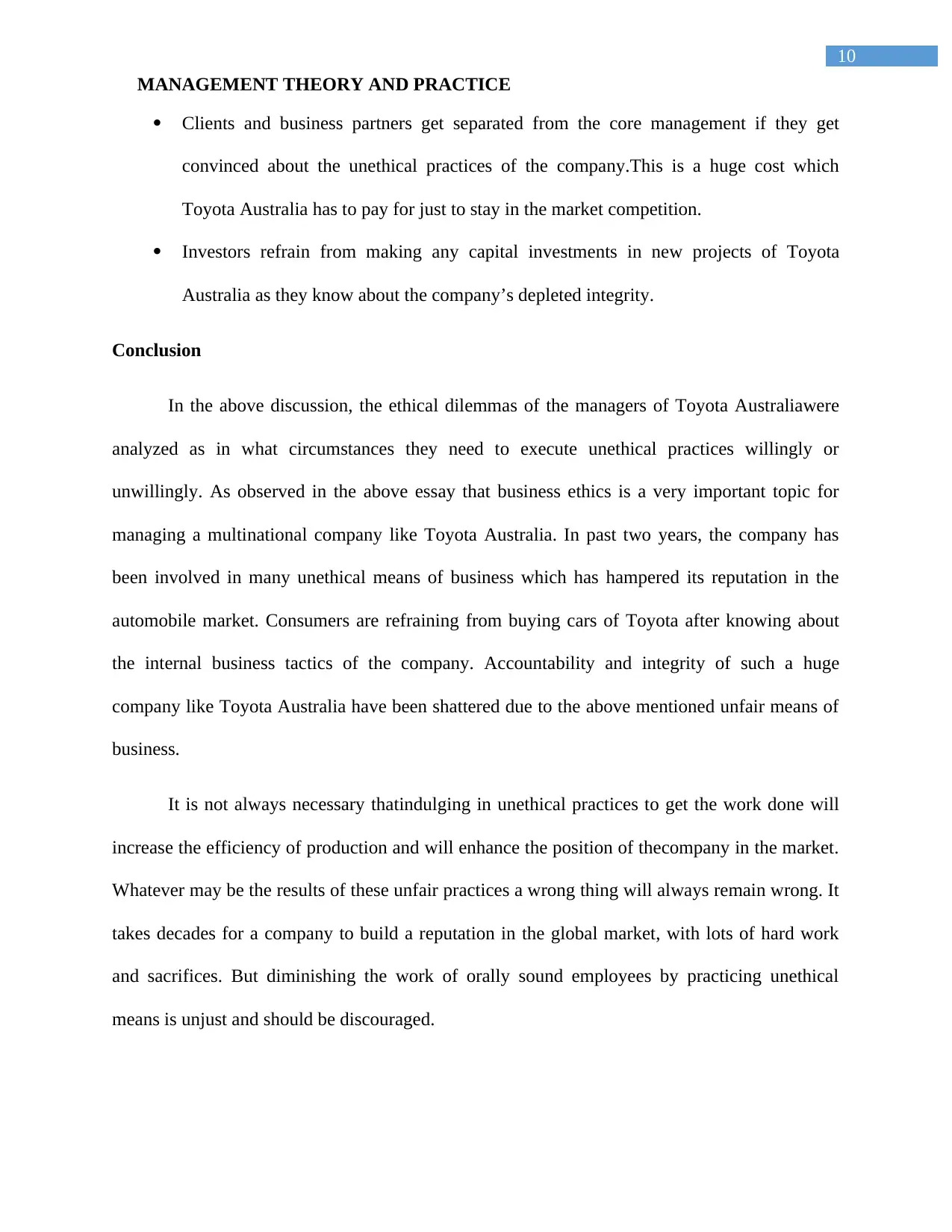
10
MANAGEMENT THEORY AND PRACTICE
Clients and business partners get separated from the core management if they get
convinced about the unethical practices of the company.This is a huge cost which
Toyota Australia has to pay for just to stay in the market competition.
Investors refrain from making any capital investments in new projects of Toyota
Australia as they know about the company’s depleted integrity.
Conclusion
In the above discussion, the ethical dilemmas of the managers of Toyota Australiawere
analyzed as in what circumstances they need to execute unethical practices willingly or
unwillingly. As observed in the above essay that business ethics is a very important topic for
managing a multinational company like Toyota Australia. In past two years, the company has
been involved in many unethical means of business which has hampered its reputation in the
automobile market. Consumers are refraining from buying cars of Toyota after knowing about
the internal business tactics of the company. Accountability and integrity of such a huge
company like Toyota Australia have been shattered due to the above mentioned unfair means of
business.
It is not always necessary thatindulging in unethical practices to get the work done will
increase the efficiency of production and will enhance the position of thecompany in the market.
Whatever may be the results of these unfair practices a wrong thing will always remain wrong. It
takes decades for a company to build a reputation in the global market, with lots of hard work
and sacrifices. But diminishing the work of orally sound employees by practicing unethical
means is unjust and should be discouraged.
MANAGEMENT THEORY AND PRACTICE
Clients and business partners get separated from the core management if they get
convinced about the unethical practices of the company.This is a huge cost which
Toyota Australia has to pay for just to stay in the market competition.
Investors refrain from making any capital investments in new projects of Toyota
Australia as they know about the company’s depleted integrity.
Conclusion
In the above discussion, the ethical dilemmas of the managers of Toyota Australiawere
analyzed as in what circumstances they need to execute unethical practices willingly or
unwillingly. As observed in the above essay that business ethics is a very important topic for
managing a multinational company like Toyota Australia. In past two years, the company has
been involved in many unethical means of business which has hampered its reputation in the
automobile market. Consumers are refraining from buying cars of Toyota after knowing about
the internal business tactics of the company. Accountability and integrity of such a huge
company like Toyota Australia have been shattered due to the above mentioned unfair means of
business.
It is not always necessary thatindulging in unethical practices to get the work done will
increase the efficiency of production and will enhance the position of thecompany in the market.
Whatever may be the results of these unfair practices a wrong thing will always remain wrong. It
takes decades for a company to build a reputation in the global market, with lots of hard work
and sacrifices. But diminishing the work of orally sound employees by practicing unethical
means is unjust and should be discouraged.
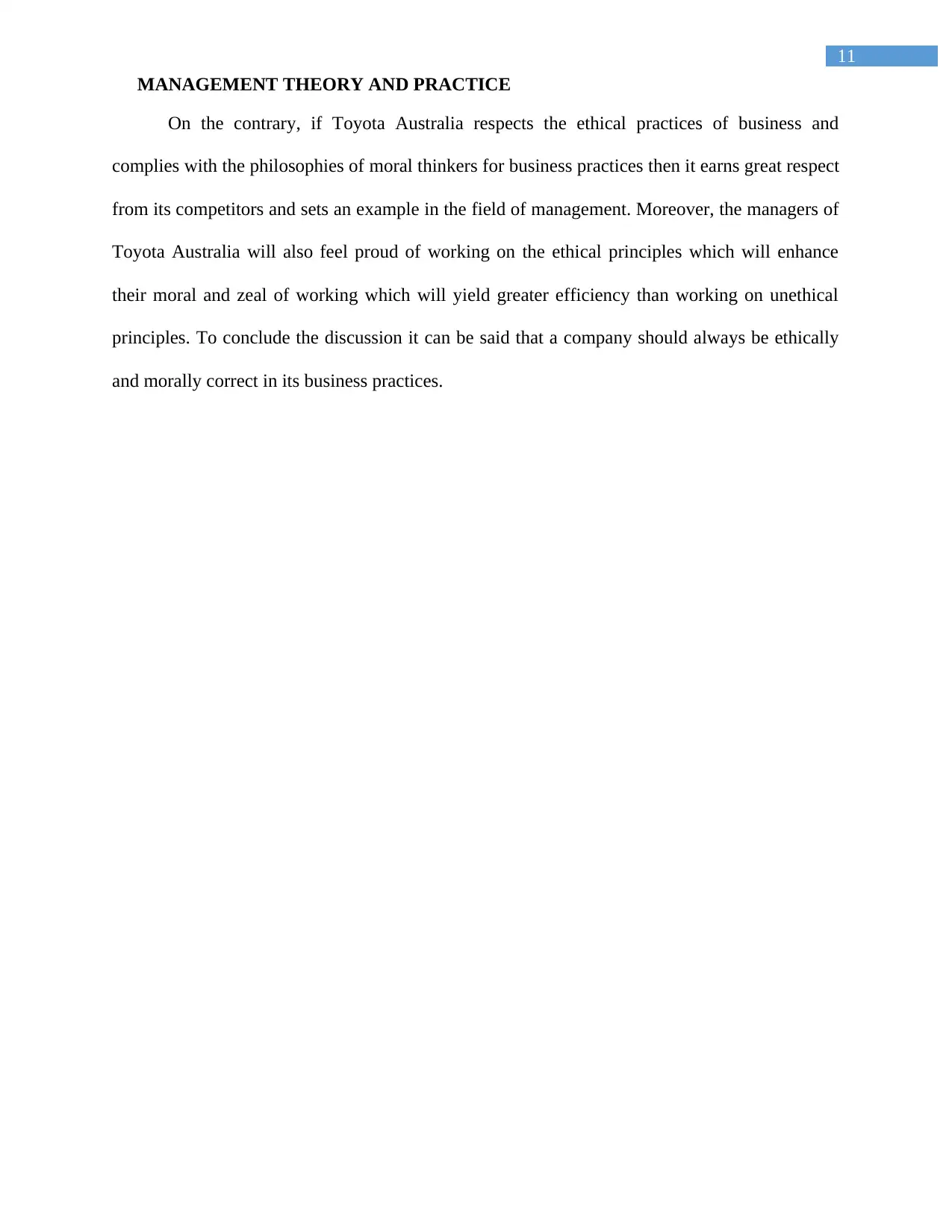
11
MANAGEMENT THEORY AND PRACTICE
On the contrary, if Toyota Australia respects the ethical practices of business and
complies with the philosophies of moral thinkers for business practices then it earns great respect
from its competitors and sets an example in the field of management. Moreover, the managers of
Toyota Australia will also feel proud of working on the ethical principles which will enhance
their moral and zeal of working which will yield greater efficiency than working on unethical
principles. To conclude the discussion it can be said that a company should always be ethically
and morally correct in its business practices.
MANAGEMENT THEORY AND PRACTICE
On the contrary, if Toyota Australia respects the ethical practices of business and
complies with the philosophies of moral thinkers for business practices then it earns great respect
from its competitors and sets an example in the field of management. Moreover, the managers of
Toyota Australia will also feel proud of working on the ethical principles which will enhance
their moral and zeal of working which will yield greater efficiency than working on unethical
principles. To conclude the discussion it can be said that a company should always be ethically
and morally correct in its business practices.
⊘ This is a preview!⊘
Do you want full access?
Subscribe today to unlock all pages.

Trusted by 1+ million students worldwide
1 out of 16
Related Documents
Your All-in-One AI-Powered Toolkit for Academic Success.
+13062052269
info@desklib.com
Available 24*7 on WhatsApp / Email
![[object Object]](/_next/static/media/star-bottom.7253800d.svg)
Unlock your academic potential
Copyright © 2020–2026 A2Z Services. All Rights Reserved. Developed and managed by ZUCOL.




